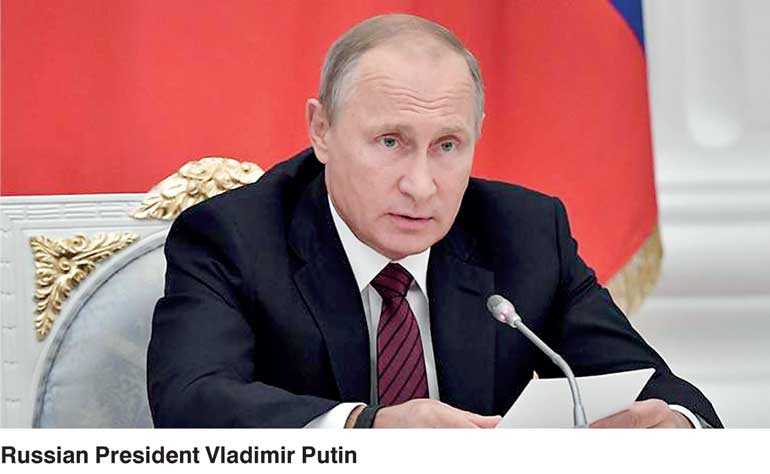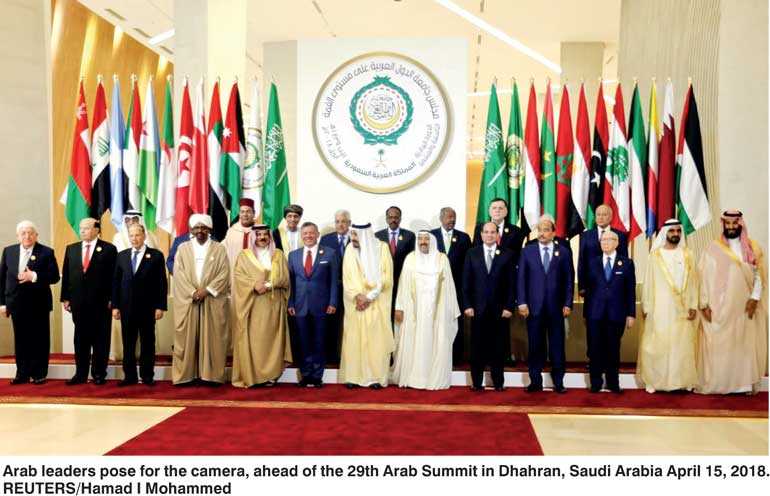Thursday Feb 19, 2026
Thursday Feb 19, 2026
Tuesday, 17 April 2018 00:00 - - {{hitsCtrl.values.hits}}

Moscow/Damascus (Reuters): Russian President Vladimir Putin warned on Sunday that further Western attacks on Syria would bring chaos to world affairs, as Washington prepared to increase pressure on Russia with new economic sanctions.
In a telephone conversation with his Iranian counterpart, Hassan Rouhani, Putin and Rouhani agreed that the Western strikes had damaged the chances of achieving a political resolution in the seven-year Syria conflict, according to a Kremlin statement.
“Vladimir Putin, in particular, stressed that if such actions committed in violation of the U.N. Charter continue, then it will inevitably lead to chaos in international relations,” the Kremlin statement said.
The U.S. ambassador to the United Nations, Nikki Haley, told CBS’ “Face the Nation” program that the United States would announce new economic sanctions on Monday aimed at companies “that were dealing with equipment” related to Syrian President Bashar al-Assad’s alleged chemical weapons use.
On Saturday, the United States, France and Britain launched 105 missiles targeting what the Pentagon said were three chemical weapons facilities in Syria in retaliation for a suspected poison gas attack in Douma on April 7.
The Western countries blame Assad for the Douma attack that killed dozens of people. The Syrian government and its ally Russia have denied involvement in any such attack.
The bombings marked the biggest intervention by Western countries against Assad and ally Russia.
French President Emmanuel Macron said on Sunday that he had convinced Trump, who previously said he wanted to take U.S. forces out of Syria, to stay for “the long term.”
The United States, France and Britain have said the missile strikes were limited to Syria’s chemical weapons capabilities and not aimed at toppling Assad or intervening in the civil war. Macron said in an interview broadcast by BFM TV, RMC radio and Mediapart online news that he had convinced Trump to focus on the chemical weapons sites.
The White House pushed back against Macron’s comments about Trump’s intentions for U.S. forces.
“The U.S. mission has not changed - the president has been clear that he wants U.S. forces to come home as quickly as possible,” White House spokeswoman Sarah Sanders said.
“We are determined to completely crush ISIS and create the conditions that will prevent its return.” she said. “In addition we expect our regional allies and partners to take greater responsibility both militarily and financially for securing the region.”
‘Hard for us, but will do more damage to the USA’
Responding to Haley’s remarks about the plans for new sanctions, Evgeny Serebrennikov, deputy head of the defence committee of Russia’s upper house of parliament, said Moscow was ready for the penalties, according to RIA news agency.
“They are hard for us, but will do more damage to the USA and Europe,” RIA quoted Serebrennikov as saying.
In Damascus, Syria’s deputy foreign minister, Faisal Mekdad, met inspectors from the global chemical weapons watchdog OPCW for about three hours in the presence of Russian officers and a senior Syrian security official.
The inspectors were due to attempt to visit the Douma site. Moscow condemned the Western states for refusing to wait for the OPCW’s findings before attacking.
Mekdad declined to comment to reporters waiting outside the hotel where the meeting took place.
Assad told a group of visiting Russian lawmakers that the Western missile strikes were an act of aggression, Russian news agencies reported.
Russian agencies quoted the lawmakers as saying that Assad was in a “good mood”, had praised the Soviet-era air defence systems Syria used to repel the Western attacks and had accepted an invitation to visit Russia at an unspecified time.
Trump had said: “Mission accomplished” on Twitter after the strikes, although U.S. Lieutenant General Kenneth McKenzie at the Pentagon acknowledged elements of the program remained and he could not guarantee that Syria would be unable to conduct a chemical attack in the future.
Russian and Iranian military help over the past three years has allowed Assad to crush the rebel threat to topple him.
Although Israel has at times urged stronger U.S. involvement against Assad and his Iranian and Lebanese Hezbollah reinforcements in Syria, it voiced backing for Saturday’s air strikes by Western powers.
Risk of wider confrontation
The leader of Lebanon’s Hezbollah said on Sunday that Western strikes on Syria had failed to achieve anything, including terrorising the army, helping insurgents or serving the interests of Israel.
Sayyed Hassan Nasrallah said the U.S. military had kept its strikes limited because it knew a wider attack would spark retaliation from Damascus and its allies and inflame the region.
“The American (military) knows well that going towards a wide confrontation and a big operation against the regime and the army and the allied forces in Syria could not end, and any such confrontation would inflame the entire region,” Nasrallah said.
The heavily armed, Iranian-backed Shi’ite Hezbollah movement, which fights alongside the Syrian army and is represented in the Beirut government, has been a vital ally of Damascus in Syria’s war.
France, the United States and Britain circulated a draft resolution to the U.N. Security Council late on Saturday that aims to establish an independent inquiry into who is responsible for chemical weapons attacks in Syria. The mechanism would look at cases where the OPCW fact-finding mission has established chemical weapons were used or likely used.
Diplomats said negotiations on the draft resolution would begin on Monday and it was not immediately clear when the United States, France and Britain wanted to put it to a vote.
Arab leaders call for probe into Syria chemical attacks, condemn Iran

DHAHRAN, Saudi Arabia (Reuters): An Arab League summit called on Sunday for an international probe into the “criminal” use of chemical weapons in Syria and condemned what it saw as Iran’s interference in the affairs of other countries.
Saudi Arabia and Iran have for decades been locked in a struggle for regional supremacy that is now being played out in proxy wars in several countries, including Yemen and Syria.
“We stress our absolute condemnation of the use of chemical weapons against the Syrian people and we demand an independent international investigation to guarantee the application of international law against anyone proven to have used chemical weapons,” said a statement distributed to journalists.
It emphasised the need for a political solution to the multi-sided Syrian war.
Saudi Arabia and its allies have expressed support for Saturday’s missile strikes by the United States, Britain and France against alleged chemical weapons facilities in Syria, while Iraq and Lebanon condemned the strikes.
Damascus denies using or possessing chemical weapons and called the strikes an act of aggression.
Military help over the past three years from Russia and Iran, which also backs Lebanon’s Hezbollah and Shi’ite Muslim militias in Iraq, has allowed Syrian President Bashar al-Assad to crush the rebel threat to topple him.
The communique called for more international sanctions on Iran and urged it to withdraw “its militias” from Syria and Yemen.
“The summit condemned Iranian interference in the internal affairs of Arab countries, either through igniting sectarian strife or planting militias in Arab countries such as Lebanon, Iraq and Yemen, and harbouring al Qaeda terrorists,” Saudi Foreign Minister Adel al-Jubeir told a news conference.
Iran, which denies the accusations, rejected the condemnation as the result of Saudi pressure.
“The heavy shadow of destructive Saudi policies is evident in ... the final statement of the summit,” Iranian state media quoted Iran’s Foreign Ministry spokesman Bahram Qasemi as saying in Tehran.
Jerusalem Summit
Saudi Arabia, which takes over the rotating chair of the Arab summit from Jordan, announced that this gathering would be named the “Quds (Jerusalem) Summit”, a reference to US President Donald Trump’s decision last year to recognise Jerusalem as the capital of Israel, which Arab states condemned.
Delegates pledged to support the Palestinians, who want East Jerusalem to be the capital of a future Palestinian state. King Salman said Saudi Arabia was donating $200 million to help them, including $50 million for the UN Relief and Works Agency (UNRWA).
Qatar did not send a senior official, a sign that its 10-month-old dispute with Saudi Arabia, the United Arab Emirates, Bahrain and Egypt is still a long way from being resolved.
The four countries severed diplomatic and transport ties with Qatar last June, accusing it of supporting terrorism. Doha denies the charges and says the boycott is an attempt to impinge on its sovereignty.
Its delegation was headed by its permanent representative to the Arab League, Saif bin Muqaddam al-Buainain, Qatar’s state news agency said.
Most of the 22 other countries sent heads of state or government. Qatari Emir Sheikh Tamim bin Hamad al-Thani headed Qatar’s delegation at last year’s summit in Jordan.
Sheikh Tamim returned to Doha on Saturday from a US trip where he met Trump. Trump publicly sided with the Saudis and Emiratis early in the crisis but is now pushing for a resolution to restore Gulf Arab unity and maintain a united front against Iran.
Asked why Qatar was not on the summit’s agenda, the Saudi foreign minister said: “Because Qatar is not on the agenda. It’s not a big issue. It’s not a big problem. It’s a very, very small problem.”
He said the issue would be resolved if Doha met the boycotting countries’ demands, which include closing the Al Jazeera television station and reducing ties with Iran.
Tunisia will host the next Arab League summit in 2019.